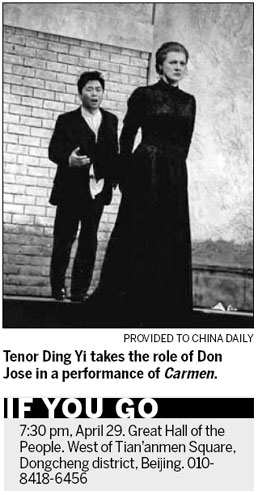In 1998, when tenor Ding Yi received a phone call from an agent in Australia inviting him to sing at the Sydney Opera House, he was forced to make a tough decision.
Ding was already a famous tenor in China, enjoying great success in the role of Calaf in Turandot in Beijing in 1996. With numerous awards, including winning places in the International Aria Competition in Marseille, France, and The First International Opera Competition of Shizuoka, Japan, he was a popular performer throughout Asia. He was also a regular performer at various national galas and events, which guaranteed him a stable and wealthy life. However, faced with the temptation of performing at the iconic Sydney Opera House, Ding decided to walk away from the career he had built up over 10 years and start over again in a totally new country.

"You know, it's a great honor to be the first Chinese tenor in the Sydney Opera House," says Ding, 50. "I like a challenge. Though my friends called me a fool, I still wanted the experience."
Ding's first performance in Australia was to sing at a national opera festival in the nation's capital, Canberra. His solo concert was widely acclaimed by the local media and led to more opportunities to sing in Australia.
However, when he first arrived in Australia his success did not come easy. Because of the language barrier and different understandings of opera between China and the West, Ding spent his first year at the Sydney Opera House sitting on a bench watching other actors rehearsing and performing.
Born to a musical family of a composer father and soprano mother, Ding grew up singing. He graduated from the Xi'an Conservatory of Music in China and taught there for 10 years, but Ding says he lost his confidence as a tenor in his first year in Australia.
But thanks to his unwavering optimism, he soon adjusted to the new environment and demonstrated his singing skills. "I realized that the only thing that helped me prove my ability is my voice," he says.
In 2002, he performed the lead role in opera La Traviata, which enabled him to become the chief tenor at the Sydney Opera House and led to other opportunities to perform the lead in masterpieces such as Tosca, Rigoletto and Faust.
His longtime idols, Australian soprano Joan Sutherland and her conductor husband, Richard Bonynge, praised Ding's performance after watching him perform Norma in 2004 at the Sydney Opera House, which was an exciting moment for Ding.
"They were the teachers of Luciano Pavarotti and they were one of the main reasons why I came to the Sydney Opera House. Therefore their praise meant so much to me," he says.
However, at the height of his career in Australia, Ding decided to return to China.
He will perform a concert with New Zealand soprano Hayley Westenra, a 26-year-old crossover singer, whose versatile range includes folk, pop and classical music, on April 29 in Beijing. Titled Wonderful Harmony, the concert will be accompanied by the orchestra of the National Ballet of China under the baton of Irish conductor Derek Gleeson.
The two singers first met at 2012's Beijing International Film Festival by singing You and Me, the 2008 Beijing Olympic theme song.
They will perform classical music and Chinese folk songs at the upcoming concert. Ding will also interpret Chrysanthemums Terrace, which was originally performed by Taiwan singer-songwriter Jay Chou.
"I returned to China hoping to bring my knowledge and experience about opera to Chinese audiences," says Ding. "Opera has a distance from ordinary audiences. That's why I will perform the pop song Chrysanthemums Terrace. I hope it will bring the audience closer to opera singing."
